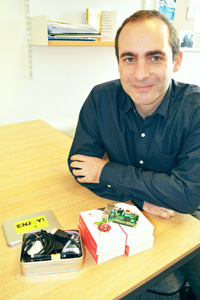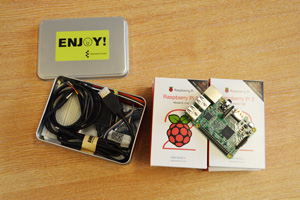
Dr Aris Perperoglou with the Raspberry Pi kits
Students at schools in Greece are going to discover the potential of low cost computing system Raspberry Pi thanks to a new project led by Dr Aris Perperoglou from the University of Essex.
Dr Perperoglou, Senior Lecturer in statistics in the Department of Mathematical Sciences, will be visiting the schools in the province of Attica, the area surrounding Athens, in November to deliver Raspberry Pi kits and teach students about what they can create.
Dr Perperoglou said: “Greece has been through a huge financial crisis and this has had a significant impact on the education system. There is a gap between the technology and facilities which Greek students can access and the resources available to students in countries like the UK.
“Computer programming and mathematical reasoning are very closely related. Greek students are often very strong mathematicians, because of the tradition in Greece of teaching mathematics, but sometimes you can tell that some students haven’t had the same chance to develop their computing skills.
“Raspberry Pi is a great way to introduce children to programming and computing which is fun and interesting, but also will give them the skills they will need in the future. It doesn’t cost a lot and you don’t need expensive computer labs or robotic labs to do incredible things.”
Raspberry Pi encourages young people to explore computing and to learn how to program. The low cost, credit-card sized computer plugs into a computer monitor or TV and uses a standard keyboard and mouse. It can then do everything you would expect a desktop computer to do, from browsing the internet and playing high-definition video, to making spreadsheets, word-processing, and playing games.
But, Raspberry Pi can also do lots more by interacting with the outside world and the kits being taken by Dr Perperoglou will include light, temperature and movement sensors which can be integrated into the Raspberry Pi system.

The Raspberry Pi kits being taken to Greece
He will be delivering kits to 1o Gimasio Eleusinas in Elefsina and Lyceum Neas Peramou Attikis. He will also be visiting two private schools Kosteas-Geitonas School in Pallini and Athens College in Psychiko.
Dr Perperoglou said: “There are lots of exciting ways the students will be able to use Raspberry Pi. For example, using basic programming skills the students you can create a robot which can avoid objects in its path. ”
The project will initially see Dr Perperoglou working with a small group of schools, but if successful it is hoped the project can be extended.
Dr Perperoglou said: “It is really important this is sustainable and I’ll be talking to the teachers about how they can support it and take it forward.”
Essex has strong links with Greece with close to 200 Greek students studying at Essex at the moment and an alumni community of nearly 4,000 – the biggest alumni community outside Greece.
Greek students have been particularly attracted to Essex to study Computer Science and Electronic Engineering alongside Economics, Accounting, Finance and Management. There is a strong alumni community in Greece as close to 90 per cent of Greek graduates return to Greece after graduating.